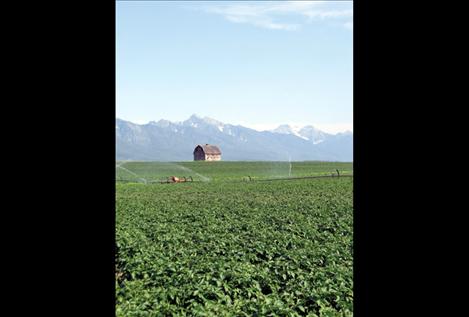Greener pastures: forum examines future of local agriculture
Hey savvy news reader! Thanks for choosing local.
You are now reading
1 of 3 free articles.
RONAN — America was once “the bread basket of the world” with nearly 9 percent of the country’s gross domestic product coming from agriculture in 1950. For the past 10 years, the percentage of the United States’ GDP originating from agriculture has hovered around 1 percent, and between 1997 and 2007, Texas lost 1.5 million acres of farmland.
Even so, according to a press release from the White House, “Innovation in U.S. agriculture has kept America’s farms among the most productive in the world. U.S. farm sector income reachedthe most productive in the world. U.S. farm sector income reached a nominal record of $98.1 billion in 2011. Adjusting for general inflation, real farm income in 2011 recorded its third highest level in the last 50 years.”
So, while usable farmland continues to decrease, new technology and innovation in the field of agriculture is making it possible to grow more crops on less land for more money.
“We have 7 billion people on the planet and fewer acres every year to grow food to feed them,” said Mark Schiltz, western manager of the Montana Land Reliance. “We need to make better use of the technology we have and the land available. We need it. We absolutely have to have it.”
On Nov. 13 at the Lake County Community Center in Ronan, Schiltz and the Montana Land Reliance will host an open forum to discuss the future of agriculture in the Mission Valley. Complete with a locally-grown lunch, presentation topics for the forum will include future global and local economic opportunities, genetically modified organisms, educational opportunities and future careers in agriculture, sustainable management of energy inputs and farmland protection. Speakers include Deputy Director of Montana’s Department of Agriculture Joel Clairmont, two Montana State University professors and the general manager of Cenex Harvest States, Mark Lalum.
“The speakers on the agenda are all really, really well known,” said Pablo farmer Dan Lake. “High quality. There’s going to be some really good information coming out of that. I think it will be well worth attending.”
“We’re looking at the future of agriculture in the Mission Valley,” Schiltz said. “Obviously, agriculture is an important part of the Mission Valley. I work with farmers and ranchers to protect their land so it’s available in the future, but we’ve never been able to guarantee agriculture into the future. That’s the goal of this forum.”
For simplicity’s sake, Schiltz said he’d broken the forum down into three different components:
Land: because farmers and ranchers must have access to land.
Economic opportunity: Because farmers and ranchers must be able to make money.
Young farmers: Because if you don’t have farmers who want to farm in the future, it is not a sustainable industry.
With this in mind, Schiltz put together a similar program in Kalispell last year with many of the same speakers and issues. Schiltz said the turnout and feedback was so good that he wanted to do another forum in Ronan. The only two topics that Schiltz does not plan to address at this forum are government regulations for agriculture and the current water rights negotiations on the Flathead Indian Reservation.
“Both of those topics deserve way more attention than a half-day discussion, and they’re really beyond the scope and scale of this program,” he said.
Schiltz added his hope for the program is that the farmers and ranchers who attend would walk away having learned something. In addition, he hopes to bring together current farmers and kids to reach and engage the younger demographic.
Lake said his biggest concern with agriculture was gaining a deeper understanding of the industry and where things are headed.
“We need to be informed of it if we want to keep up and make a plan that keeps us profitable while still being sustainable in the industry and the community,” he said.
Lake said he believes in the next 20 years, science will play an even bigger role in agriculture than it does today.
“There isn’t such a thing as ‘getting lucky’ anymore,” Lake said. “We have to manage every input, every day; every incident of disease or insect pressure is all managed from a scientific standpoint. The research going into agriculture is so important right now because the economics of it don’t allow for mistakes.”
Markus Braaten, Agronomy Lead for Agro-Trend USA and event speaker on the sustainable management of energy inputs, said he believes the agriculture trend in the next 10 years will move toward an increase in efficiency in terms of both the amount of production per acre and maximizing the profitability of each acre.
“We can do more with less, and we’re going to have to because our resources are finite, and we’ve got to work really hard at protecting them,” Lake said.
In addition, Braaten said he believes the number of farmers will go down, but remaining farmers operations will become larger and more complex.
“One of the areas where we’re seeing tremendous growth right now is in the smaller type of farm where they’re involved not only in production, but marketing as well, whether it’s organic, market garden or specialty livestock production. I think we’re going to see an increase in those types of operations as well in the next few years,” Braaten said. “A lot of it will stem from consumer interest and preference.”
When asked if he had any advice for the younger generation of farmers, Lake said the future farmers should do whatever possible to get themselves exposed to or involved with the industry.
“There are a lot of opportunities, but it takes somebody who has that desire to be taught,” he said.
















